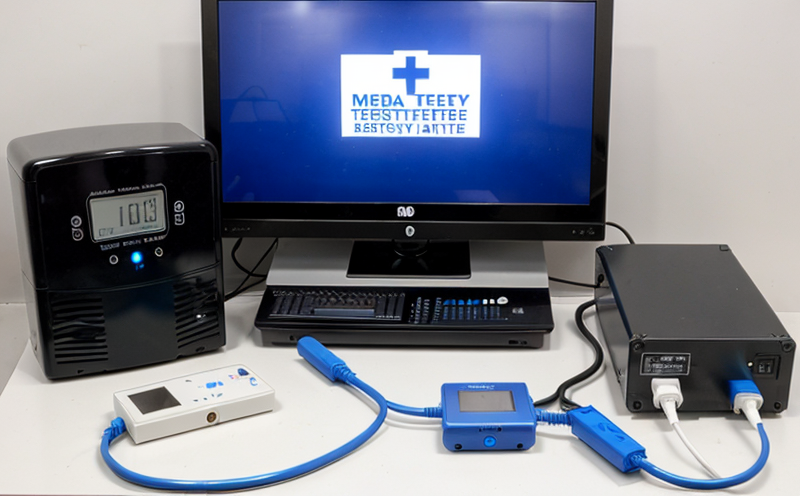IEC 62133-2 Medical Device Lithium-Ion Battery Safety Testing
The International Electrotechnical Commission (IEC) standard IEC 62133-2 is a critical regulatory framework for the safety testing of medical device lithium-ion batteries. This standard ensures that these batteries meet stringent safety requirements, which are essential to safeguard patients and healthcare professionals from potential risks associated with battery malfunctions.
Battery failures in medical devices can lead to serious consequences, including product recalls, patient injuries, and even fatalities. IEC 62133-2 aims to prevent such incidents by establishing a series of tests designed to evaluate the safety, durability, and reliability of lithium-ion batteries used in medical applications.
The standard covers various aspects of battery testing, including thermal stability, mechanical stress resistance, electrical overcurrent protection, and more. Compliance with these stringent requirements is essential for manufacturers who want to ensure their products meet global regulatory standards and maintain patient safety.
Our laboratory specializes in providing comprehensive IEC 62133-2 compliance services tailored to the unique needs of medical device developers. We utilize advanced instrumentation and expert technicians to ensure accurate and reliable testing results that can help you navigate the complexities of this standard effectively.
By partnering with us, you gain access to state-of-the-art facilities equipped with high-precision equipment necessary for conducting thorough safety assessments. Our team comprises professionals experienced in both regulatory compliance and technical expertise, ensuring your products not only pass but exceed industry expectations.
To begin the testing process, we first conduct a detailed review of your product specifications to identify any specific requirements outlined by IEC 62133-2. This allows us to tailor our approach towards meeting those particular needs while still adhering strictly to all relevant clauses within the standard.
Once we have gathered sufficient information about your device, specimen preparation becomes crucial. We ensure that each battery is prepared according to prescribed methods laid out in IEC 62133-2, which may include charging protocols, conditioning procedures, and other necessary steps designed to simulate real-world conditions as closely as possible.
The actual testing phase involves multiple stages aimed at evaluating different aspects of the battery's performance. These can range from simple visual inspections for defects down to complex thermal cycling tests that assess how well the battery handles extreme temperatures during operation. Throughout these procedures, our highly skilled engineers meticulously monitor every aspect of each test run, recording all relevant data points for thorough analysis.
After completing all required tests, we generate detailed reports summarizing our findings and any discrepancies noted throughout the process. These documents serve as valuable resources not only for satisfying regulatory bodies but also for continuously improving your product design based on empirical evidence gathered during testing.
In summary, IEC 62133-2 Medical Device Lithium-Ion Battery Safety Testing is an indispensable service offered by our laboratory to help ensure the highest level of safety and reliability in medical devices utilizing lithium-ion batteries. By partnering with us early in your development cycle, you can rest assured that your products will meet or exceed all necessary standards while minimizing risks associated with potential failures.
Applied Standards
IEC 62133-2 is one of several international standards designed to address the safety concerns surrounding lithium-ion batteries used in various applications, including medical devices. It builds upon earlier versions of IEC 62133, which focused primarily on portable electronics.
- IEC 62133-2: This specific part covers additional requirements for use in medical devices beyond those specified in previous editions.
- ISO/IEC 17025: Our laboratory is certified according to this international standard, ensuring that our testing capabilities meet the highest quality assurance standards.
The combination of these standards provides a robust framework for evaluating lithium-ion batteries used in medical devices. By adhering strictly to both IEC 62133-2 and ISO/IEC 17025, we can offer unparalleled accuracy and reliability in our testing services.
Scope and Methodology
The scope of IEC 62133-2 Medical Device Lithium-Ion Battery Safety Testing encompasses a wide range of tests aimed at ensuring the safety, durability, and performance of lithium-ion batteries in medical devices. Key areas covered include:
- Thermal stability
- Mechanical stress resistance
- Electrical overcurrent protection
- Battery management system (BMS) functionality
- Packaging integrity and labeling requirements
- Safety margin evaluation
The methodology employed in our laboratory follows closely the guidelines provided by IEC 62133-2, ensuring that each test is conducted under controlled conditions to mimic real-world scenarios as accurately as possible. This approach helps identify potential weaknesses early on so they can be addressed before product release.





